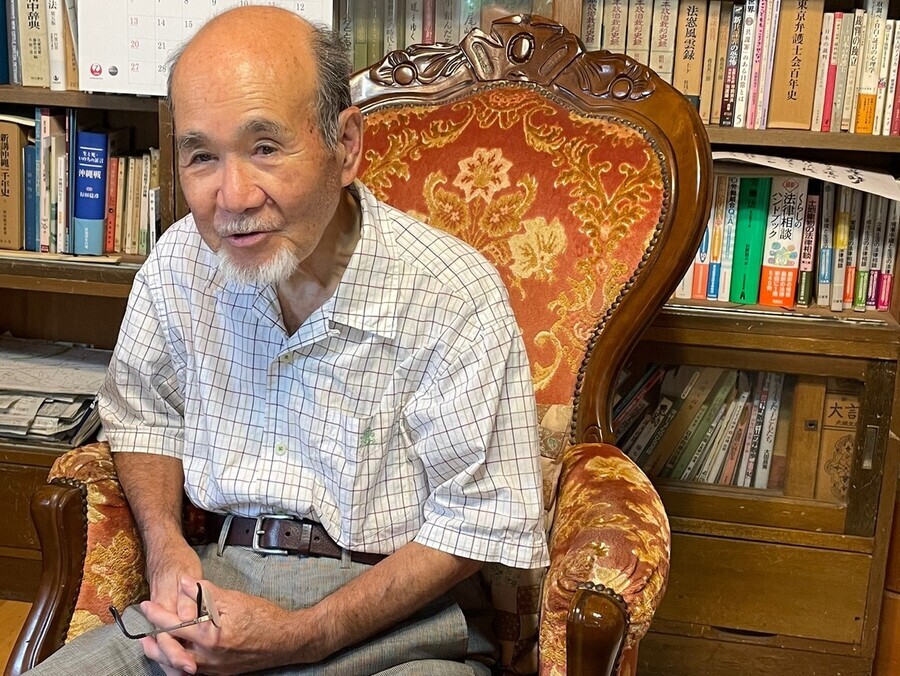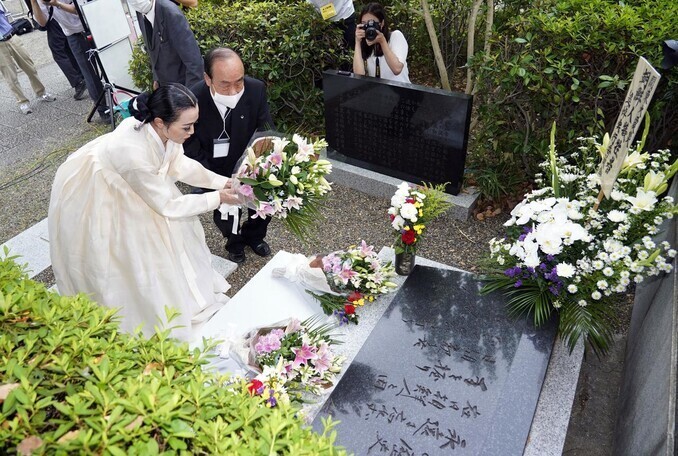hankyoreh
Links to other country sites 다른 나라 사이트 링크
“Never again”: Amid government silence, Japanese citizens take memorializing massacred Koreans into own hands

“It makes me feel ashamed as a human being not to have properly confronted the massacres of Koreans. I intend to keep speaking out to ensure that such a thing never happens again. That is my duty in life now.”
While the South Korean and Japanese governments remain apathetic, members of the Japanese public have been holding annual ceremonies for nearly half a century to commemorate Koreans massacred in the wake of the Great Kanto Earthquake of 1923.
The organizer of these events has been the Executive Committee for Ceremonies to Commemorate Korean Victims from the Great Kanto Earthquake, the members of which include Japanese civil groups such as the Niccho Kyokai (Japan-Korea Association).
With this year marking the earthquake’s centennial, another memorial ceremony is scheduled to take place Friday at Yokoamicho Park in Tokyo’s Sumida Ward. On Aug. 16, the Hankyoreh met with the executive committee’s chairperson, 82-year-old Yasuhiko Miyagawa, at his home in Tokyo.
“The commemorations started in 1963, which was the 40th anniversary of the earthquake. Throughout the Kanto region [the area of Japan centering around Tokyo and its surrounding prefectures], there were movements to properly investigate the massacres of Koreans and leave a record of them,” he explained.
“The Niccho Kyokai put together its own investigation team, which spent around a decade meeting with victim family members and witnesses and hunting down records,” he added.
As more eyewitness accounts and other information were uncovered, the horrific events of that day in 1923 — previously obscured by Japanese government cover-ups — began coming into sharper focus. The members agreed on the need to remember this terrible history and honor the innocent Koreans who were slaughtered.
For the quake’s 50th anniversary in 1973, a large-scale fundraising effort was held to put up a memorial.
“It may be hard to believe in a climate like today’s, but when the memorial was being raised, the representative committee members included chief secretaries from all the major parties in the Tokyo Metropolitan Assembly, including the Liberal Democratic Party, Komeito, Socialist Party, and Communist Party,” he recalled.

The memorial to the Korean massacre victims was donated to the Tokyo metropolis and placed in the public Yokoamicho Park. In the process, civic groups were forced to make certain compromises with the city over what the monument would say.
The first line of the monument states, “Amid the chaos following the Great Kanto Earthquake in September 1923, around 6,000 Koreans lost their honorable lives because of wrongful machinations and groundless rumors.”
The original inscription planned by civic groups phrased this as “wrongful machinations and groundless rumors perpetrated by authorities” — making it clear that the Japanese government had been responsible. But that part ended up being omitted.
“The Tokyo metropolis was involved in the content of the memorial’s inscription,” Miyagawa said.
“It’s outrageous that Tokyo Gov. Yuriko Koike has not sent a condolence message for the past seven years since 2017 because she ‘takes issue’ with part of the inscription,” he added, his voice taking on a forceful tone.
“At a surface level, she says that she doesn’t want to send condolence messages for ‘individual events,’ but really she doesn’t want to acknowledge the historical truth of the massacres of Koreans,” he continued. “She doesn’t want to confront Japan’s shameful history.”
Miyagawa also said that Koike’s refusal to send a condolence message bears connections to the historical attitude of far-right figures who have distorted the facts regarding the massacres of Koreans.
Far-right groups in Japan have claimed that the numbers of Koreans killed after the Great Kanto Earthquake have been “inflated” and that the massacres themselves were legitimate acts of self-defense against rioting by Koreans at the time. They have also demanded the removal of the memorial to Korean victims.
Since 2017 — the same year that Koike first refused to send a condolence message — a far-right group known as Soyokaze (“breeze”) has been holding deliberately disruptive demonstrations near the park where the commemorative ceremonies for Korean victims have been held, with participants shouting that the Korean death toll of 6,000 victims is a “fabrication.”
“I think this is a very dangerous situation,” Miyagawa said. “I’m worried the reason the far-right groups keep stirring up conflict is because they want to make it impossible to hold commemorative ceremonies for Koreans.”
At the same time, he remarked that the number of ordinary Japanese people attending the ceremonies has increased markedly amid media reports on Koike’s refusal to send a condolence message and the disruptive protests by far-right groups.
Miyagawa stressed that the Japanese government needs to take action by investigating the facts about the massacres of Koreans and clearly showing that the state bears responsibility for the horrors of that time.
As a lawyer, he emphasized the importance of a recommendation sent in 2003 to then-Japanese Prime Minister Junichiro Koizumi by the Japan Federation of Bar Associations. In connection with the massacres, the federation urged the state to “assume responsibility for apologizing to the victims and their family members” and to “investigate the circumstances and facts of the massacres to clearly establish the causes.”
In the 20 years since then, the Japanese government has never replied.
“I think what led to the tragedy was a combination of discrimination and prejudice stemming from colonial rule on one hand and fear of Korean resistance on the part of those in power, including things like the March 1 Independence Movement,” Miyagawa said.
“The massacres of Koreans are a fact that cannot be concealed no matter how hard they try. A hundred years may pass, but the commemorative ceremonies to share the truth of that day will continue,” he added.
By Kim So-youn, Tokyo correspondent
Please direct questions or comments to [english@hani.co.kr]

Editorial・opinion
![[Column] Tariffs on China: Trump was dumb, Biden dumber [Column] Tariffs on China: Trump was dumb, Biden dumber](https://flexible.img.hani.co.kr/flexible/normal/500/300/imgdb/original/2024/0520/191716191153918.jpg) [Column] Tariffs on China: Trump was dumb, Biden dumber
[Column] Tariffs on China: Trump was dumb, Biden dumber![[Column] What if Seoul took reunification by force off the table? [Column] What if Seoul took reunification by force off the table?](https://flexible.img.hani.co.kr/flexible/normal/500/300/imgdb/original/2024/0520/3017161928630494.jpg) [Column] What if Seoul took reunification by force off the table?
[Column] What if Seoul took reunification by force off the table?- [Editorial] Intensifying US-China rivalry means Seoul must address uncertainty with Beijing sooner than later
- [Column] When ‘fairness’ means hate and violence
- [Editorial] Yoon must stop abusing authority to shield himself from investigation
- [Column] US troop withdrawal from Korea could be the Acheson Line all over
- [Column] How to win back readers who’ve turned to YouTube for news
- [Column] Welcome to the president’s pity party
- [Editorial] Korea must respond firmly to Japan’s attempt to usurp Line
- [Editorial] Transfers of prosecutors investigating Korea’s first lady send chilling message
Most viewed articles
- 1Xi, Putin ‘oppose acts of military intimidation’ against N. Korea by US in joint statement
- 2Kim Jong-un wanted to meet with residents of shelled Yeonpyeong Island in South, Moon recalls in mem
- 3To weigh costs and benefits, Korea must stop treating US troop presence as a sacred cow
- 4[Column] What if Seoul took reunification by force off the table?
- 5Berlin mayor hints at tearing down ‘comfort women’ memorial in city
- 6[Column] Tariffs on China: Trump was dumb, Biden dumber
- 7[Editorial] Transfers of prosecutors investigating Korea’s first lady send chilling message
- 8Naver’s union calls for action from government over possible Japanese buyout of Line
- 9[Exclusive] Truth commission to seek additional murder charges for figures behind 1980 Gwangju massa
- 10[Column] US troop withdrawal from Korea could be the Acheson Line all over